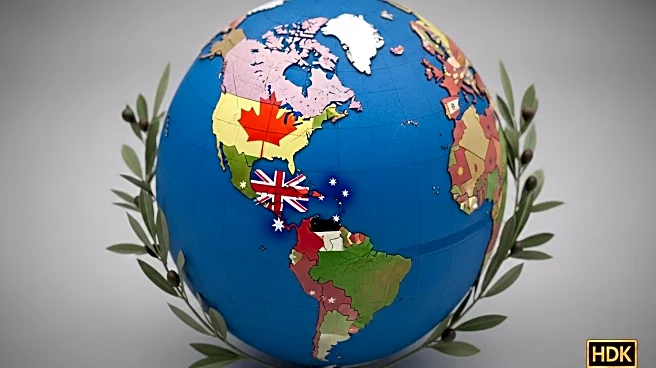What is the story about?
What's Happening?
Canada, Australia, and Britain have officially recognized a Palestinian state, a move that comes nearly two years after the October 7 massacre by Hamas. British Prime Minister Keir Starmer emphasized that this recognition is not a reward for Hamas, which he described as a terrorist organization. The decision reflects concerns over the fading prospects for a two-state solution and aims to keep the hope for peace alive. The recognition is part of a broader international trend, with several other countries expected to follow suit during the U.N. General Assembly.
Why It's Important?
The recognition by these three G7 nations represents a significant diplomatic victory for the Palestinians, potentially altering the geopolitical landscape. It highlights growing international frustration with Israel's policies, including settlement expansion and the humanitarian crisis in Gaza. This move could increase pressure on Israel to engage in peace negotiations and reconsider its approach to the conflict. The recognition also underscores the importance of addressing Palestinian aspirations for statehood and the need for a viable two-state solution.
What's Next?
As more countries are expected to recognize Palestine, the diplomatic pressure on Israel may intensify, potentially leading to changes in its policies or international relations. Israel may respond with measures such as annexing parts of the West Bank, which could escalate tensions and provoke international condemnation. The recognition could influence upcoming discussions at the U.N. General Assembly, shaping future peace initiatives and diplomatic efforts. The situation may also impact U.S. foreign policy, as President Trump is set to meet with Netanyahu, potentially affecting bilateral relations.
Beyond the Headlines
The recognition of Palestine by major Western nations challenges historical narratives and colonial legacies, prompting discussions on justice and reconciliation. It highlights the ethical dimensions of the Israeli-Palestinian conflict and the importance of addressing humanitarian concerns. The move may influence public opinion and advocacy efforts, encouraging broader support for Palestinian rights and statehood. Long-term, it could reshape the diplomatic landscape, affecting alliances and regional stability, while emphasizing the need for dialogue and peace.















